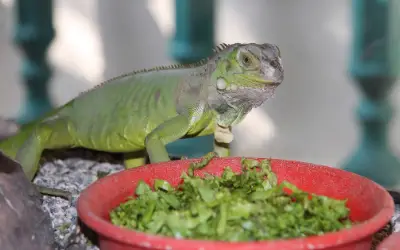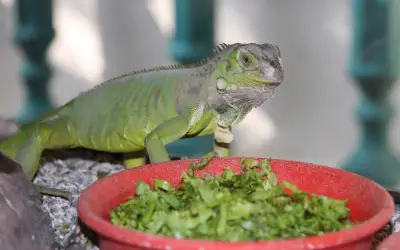Are you a new iguana owner wondering what to feed your scaly friend? Or maybe you’re a seasoned iguana parent looking to switch up your pet’s diet. Whatever your situation, finding the right diet for your iguana is crucial to their health and happiness.
While iguanas are known for being herbivores, their diets can be more complex than simply feeding them lettuce every day. From fruits and vegetables to specialized iguana pellets, there are many options to consider when it comes to feeding your iguana. So, let’s explore the world of iguana diets and find the perfect food for your unique pet.
Iguanas are herbivorous reptiles that need a diet rich in leafy greens and vegetables. Offer them a variety of foods such as collard greens, kale, mustard greens, dandelion greens, carrots, squash, and bell peppers. You can also add fruits like strawberries, mangoes, and papayas to their diet. Avoid feeding them animal-based foods or lettuce as it has low nutritional value.

What to Feed My Iguana?
If you are an iguana owner, then you must be looking for the best diet to keep your pet healthy and happy. Feeding the right food to your iguana is crucial because it helps to keep their digestive system healthy and functioning properly. In this article, we will discuss what to feed your iguana to keep them healthy and happy.
Leafy Greens
Leafy greens are one of the most important foods for your iguana. They are rich in nutrients and are low in calories, which makes them an ideal food for your pet. You can feed your iguana a variety of leafy greens, such as collard greens, kale, mustard greens, and dandelion greens.
Leafy greens are rich in calcium and vitamin D, which are essential for the health of your iguana’s bones and teeth. They also contain fiber, which helps to keep your iguana’s digestive system healthy and functioning properly.
Benefits of Feeding Leafy Greens
– Rich in nutrients
– Low in calories
– Essential for bone and teeth health
– Contains fiber
Leafy Greens vs. Other Foods
Leafy greens are better than other foods because they are low in calories and rich in nutrients. Other foods, such as fruits and vegetables, are also good for your iguana, but they are higher in calories.
Vegetables
Vegetables are also an important part of your iguana’s diet. You can feed your iguana a variety of vegetables, such as squash, carrots, and sweet potatoes. Vegetables are rich in vitamins and minerals, which are essential for the health of your iguana.
Benefits of Feeding Vegetables
– Rich in vitamins and minerals
– Essential for your iguana’s health
Vegetables vs. Other Foods
Vegetables are better than other foods because they are rich in vitamins and minerals. Other foods, such as fruits and leafy greens, are also good for your iguana, but they are lower in vitamins and minerals.
Fruits
Fruits are also an important part of your iguana’s diet. You can feed your iguana a variety of fruits, such as bananas, apples, and grapes. Fruits are rich in vitamins and minerals, which are essential for the health of your iguana.
Benefits of Feeding Fruits
– Rich in vitamins and minerals
– Provides variety to your iguana’s diet
Fruits vs. Other Foods
Fruits are good for your iguana, but they should be fed in moderation because they are higher in sugar than other foods. Other foods, such as leafy greens and vegetables, are better for your iguana’s overall health.
Protein
Protein is also an important part of your iguana’s diet. You can feed your iguana a variety of protein sources, such as crickets, mealworms, and tofu. Protein is essential for the growth and development of your iguana.
Benefits of Feeding Protein
– Essential for growth and development
– Provides variety to your iguana’s diet
Protein vs. Other Foods
Protein is important for your iguana’s overall health, but it should be fed in moderation. Other foods, such as leafy greens and vegetables, should make up the majority of your iguana’s diet.
Supplements
Supplements are also an important part of your iguana’s diet. You can provide your iguana with calcium and vitamin D supplements to ensure that they are getting enough of these essential nutrients.
Benefits of Feeding Supplements
– Ensures that your iguana is getting enough calcium and vitamin D
Supplements vs. Other Foods
Supplements are not a replacement for a healthy diet. They should be used in addition to a healthy diet to ensure that your iguana is getting all of the essential nutrients that they need.
Conclusion
In conclusion, feeding your iguana a healthy and balanced diet is crucial for their overall health and happiness. Leafy greens, vegetables, fruits, protein, and supplements should all be included in your iguana’s diet to ensure that they are getting all of the essential nutrients that they need. Remember to feed your iguana in moderation and to provide them with fresh food and water every day.
Frequently Asked Questions
As an iguana owner, one of the most important aspects of their care is providing them with a healthy and balanced diet. Here are some common questions and answers about what to feed your iguana.
What should I feed my iguana?
Iguanas are herbivores and require a diet that is high in fiber and low in protein. A good diet for an iguana includes a variety of leafy greens and vegetables such as collard greens, turnip greens, mustard greens, kale, and broccoli. They can also consume fruits such as apples, bananas, and strawberries, although these should be given in moderation due to their high sugar content.
It is important to avoid feeding your iguana animal-based products such as meat, dairy, and eggs as these can lead to health problems such as gout and kidney stones. Additionally, feeding your iguana processed or sugary foods can also be harmful to their health.
How often should I feed my iguana?
Iguanas should be fed daily, with a variety of greens and vegetables offered at each feeding. It is important to monitor their eating habits and adjust their diet as needed. Additionally, it is important to ensure that fresh water is available at all times.
Younger iguanas may require more frequent feedings, while adult iguanas may only need to be fed every other day. It is important to consult with a veterinarian to determine the appropriate feeding schedule for your iguana based on their age and overall health.
Can I give my iguana supplements?
In general, iguanas do not require supplements if they are being fed a balanced and varied diet. However, if your iguana is not eating enough or has specific health concerns, your veterinarian may recommend supplements such as calcium or vitamin D3.
It is important to only give supplements as prescribed by a veterinarian, as over-supplementing can lead to health problems such as metabolic bone disease.
Can I feed my iguana insects?
No, iguanas are strictly herbivores and should not be fed insects or other animal-based products. Feeding your iguana insects can lead to health problems and should be avoided.
If you are looking to provide your iguana with additional protein, there are plant-based options such as tofu or cooked beans that can be added to their diet in moderation.
What should I do if my iguana stops eating?
If your iguana stops eating, it is important to consult with a veterinarian as soon as possible. A loss of appetite can be a sign of an underlying health issue and should not be ignored.
In the meantime, you can try offering your iguana a variety of their favorite foods to entice them to eat. It is also important to ensure that their enclosure is at the appropriate temperature and humidity levels, as these can impact their appetite and overall health.
What do Iguanas Eat – Meal prepping for Iguanas
In conclusion, feeding your iguana can be a challenge, but with the right knowledge and preparation, it can be a rewarding experience. Remember to provide a balanced diet of vegetables, fruits, and protein, and avoid feeding your iguana anything toxic or harmful.
Additionally, it’s important to monitor your iguana’s eating habits and adjust their diet accordingly. If you notice any changes in behavior or appetite, consult with a veterinarian who specializes in reptiles to ensure your iguana is healthy and getting the proper nutrition.
Overall, taking care of an iguana requires dedication and patience, but the rewards of a healthy and happy pet are well worth the effort. With these tips in mind, you can provide your iguana with a nutritious and satisfying diet that will keep them thriving for years to come.


